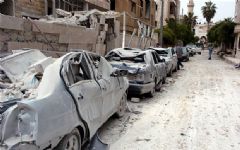Human Rights Voices
While the UN devotes its human rights operations to the demonization of the democratic state of Israel above all others and condemns the United States more often than the vast majority of non-democracies around the world, the voices of real victims around the world must be heard.
Syria, April 30, 2012
20 deaths reported after explosions rock Syrian city
Original source
A third explosion rocked the northwestern Syrian city of Idlib on Monday, hours after twin car bomb blasts killed at least 20 people, opposition activists said.
About 100 people -- mostly civilians -- were injured in the earlier car bomb blasts, state media said. Most of those killed were members of the security forces, the Syrian Observatory for Human Rights said, citing medical sources.
One car bomb targeted a government security building, the opposition Local Coordination Committees of Syria said. The opposition network also reported heavy artillery shelling in Idlib. The state-run Syrian Arab News Agency showed photos of buildings in ruins and cars crushed by debris.
A group of U.N. observers visited the sites of the car bomb blasts, state media reported.
No casualties were reported after the third blast, which initial reports indicate was caused by a roadside bomb, the Syrian Observatory for Human Rights said. Gunfire and explosions also echoed through Syria's capital early Monday, opposition activists and state media said, trading accusations over who was behind the violence.
Syrian state-run media showed images it said were from Damascus on Monday of a damaged police car and a pillar with a missing chunk of concrete outside the Central Bank of Syria building. State TV said both were attacked by an "armed terrorist group" using rocket-propelled grenades, adding that four police officers were wounded in the first attack and no casualties were reported from the bank attack. But the LCC said the government was responsible and "has resorted to fabricating staged explosions that have taken the lives of dozens of Syrians." The opposition group cited what it said were "suspicious explosions in or near several government buildings, including the official state media and television office; a security center in Rukneddine; and the Central Bank building."
"These tricks no longer fool anyone, especially given the fact that the regime has resorted to these escalations every time there is political movement at the Arab, regional or international level to find a political solution to the crisis in which the regime kills its people who are demanding freedom," the LCC said. Elsewhere, gunfire from the Syrian army killed one person Monday morning in the Homs province town of Talbiseh, according to the LCC.
CNN cannot independently verify reports of violence and deaths within Syria, as the government has restricted access by most of the international media.
Dozens of additional U.N. monitors are expected in Syria this week, even after the mission's leader admitted the group's efforts are futile unless all sides commit to peace.
"Ten unarmed observers, 30 unarmed observers, 300 unarmed observers, even 1,000 unarmed observers cannot solve all the problems," Maj. Gen. Robert Mood said after arriving in Damascus on Sunday. "So I call on everyone to help us and cooperate with us in this very challenging task ahead of us."
Both the Syrian regime and the rebel Free Syrian Army have accepted a peace plan laid out by U.N.-Arab League special envoy Kofi Annan. A key element of the plan involves a cease-fire by all parties.
"To achieve the success of Kofi Annan's six-point plan ... I call on all to stop the violence and to help us on a continued cessation of violence in all its forms," said Mood, the head of the U.N. observer mission.
About 30 observers were on the ground by Monday, with 50 expected by Friday, Annan spokesman Ahmad Fawzi said via Twitter. The U.N. Security Council has authorized up to 300 unarmed military monitors for the mission in Syria.
"This is a matter of utmost urgency for the United Nations, and all efforts are in place to make sure that we get the people on the ground as quickly as possible," Neeraj Singh, the observer team's spokesman, said Sunday.
Opposition activists in Homs, a bastion of anti-government sentiment, have said attacks by Bashar al-Assad's forces stop only during U.N. monitors' visits.
Since the cease-fire deadline passed April 12, more than 700 people have been killed, the LCC said.
Syria has been engulfed in violence since March 2011, when government forces started cracking down on demonstrators who were peacefully protesting al-Assad's regime. The president's family has ruled Syria for 42 years. Some opposition members have since taken up arms against the regime forces.
The United Nations estimates that at least 9,000 people have died in the conflict, while opposition groups put the death toll at more than 11,000.

